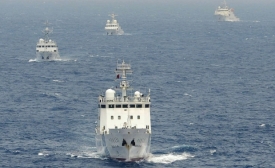public opinion
On Wednesday evening, just before the 13th anniversary of the Sept. 11, 2001, attacks that have shaped modern American history, President Obama gave a speech that outlined a plan for fighting the Islamic State extremist group. Here's some of the reaction from a selection of countries.
Mr. Obama is acting as polls show rapidly shifting public opinion, with a large majority of Americans now favoring military action against ISIS in Iraq and Syria, even as they express deep misgivings about the president’s leadership, Mr. Obama is also facing difficult crosscurrents on Capitol Hill, where Republican lawmakers, initially reluctant to demand congressional authorization of military action, have begun agitating for a vote...
A latest poll unveiled on Tuesday that tapping public diplomacy to repair bilateral relations continued to attract public support from both China and Japan. The contribution of people-to-people interactions to improving ties were endorsed by 64.4 percent of the Japanese public and 63.4 percent of its Chinese counterpart, , according to the 10th Public Opinion on China-Japan Relations survey, which has been co-sponsored annually by China Daily and Japanese nonprofit think tank Genron NPO.
According to interviews, diplomatic cables, and other documents obtained by Mother Jones, American officials—some with deep ties to industry—also helped US firms clinch potentially lucrative shale concessions overseas, raising troubling questions about whose interests the program actually serves.
Gérard Araud, France's newly minted ambassador to the United States, arrived in Washington this month with a reputation for speaking his mind, a potentially perilous distinction for a career diplomat. A recent convert to Twitter, Araud has skirmished with human rights activists over French policy in Western Sahara, defended France's controversial burqa ban, denounced Russian aggression, and poked fun atWashington's Iraq war hawks.

CPD University Fellow and USC Annenberg Professor Thomas Hollihan publishes a new book with contributions from Dr. Patricia Riley.
If it wants to strengthen its presence in the international community and adequately inform a wider audience abroad about itself, Japan should strategically strengthen its public relations overseas and promote cultural exchanges with other nations. In its budgetary request for fiscal 2015, the Foreign Ministry has requested about 50 billion yen (about $475 million) for a new key budgetary item called "strategic proliferation of information abroad."
The Dalai Lama is losing friends all over the place as the world undergoes a geopolitical realignment. The Dalai Lama used to be the guy everyone wanted at their party. But since China's emergence as an economic superpower, he's become an awkward guest to invite. Around the world, governments are limiting their contact with him — in some cases because of direct pressure by China, and in other cases, because of the chilling effect that pressure creates.







